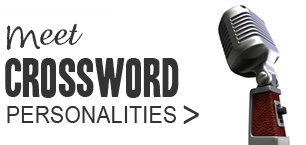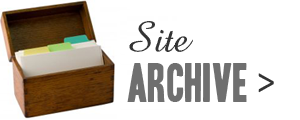Introductory Post: Interviews With Ace Solvers
Peter Biddlecombe

 Peter Biddlecombe, 48, from Buckinghamshire, UK, is one of the quickest cryptic crossword solvers in the world. A regular solver of the Times crossword for about 30 years, his average Times solving time is about 10 minutes and his best-ever time is 3 minutes. At the annual Times Crossword Championship, Peter has been a finalist several times in a row and the winner twice.
Peter Biddlecombe, 48, from Buckinghamshire, UK, is one of the quickest cryptic crossword solvers in the world. A regular solver of the Times crossword for about 30 years, his average Times solving time is about 10 minutes and his best-ever time is 3 minutes. At the annual Times Crossword Championship, Peter has been a finalist several times in a row and the winner twice.
Peter also runs and contributes to the blog site "Times for the Times", which discusses each day's Times crossword solutions.
In the final interview of the ace solver interview series, Peter shares some crossword-related experiences from his life. Read on to discover "the secret" of his amazing solving prowess.
Q1: When and how did you start solving crosswords?
Peter: My first proper go at cryptics was in summer 1976, aged 16. I found a Pan book of puzzles in a bookshop. These books were graded, with about 20 puzzles each at four levels of difficulty. I didn’t have a cryptic crossword expert to help in human or book form, so had to work out the clues as best I could, often after guessing at definitions to fit clue and answer length, and hoping to find crossing “hits” in the grid. I gradually worked out various crossword clichés like Gunners=RA or French art = ES, but often without understanding them properly. When school restarted that autumn, there was a cheap offer on The Times for students, so I had an optimistic go at the Times puzzle each day. It was far too much of a leap, and I often only got a few answers – finishing about a quarter of the puzzle was typical, and my first Times solution only came several years later, after switching to the Guardian for a while and making better progress.
(This was very much a reflection of the puzzles as they were at the time – this method would probably be useless these days.)
Q2: Which crosswords do you solve currently, how often and how do you fare with them?
Peter: I tackle the Times cryptic and Concise puzzles every day. When I have time (maybe three days a week) I do the Independent one too. The Times puzzle can take anything from 3 minutes upwards, with an average time around 10 and at least 90% of the puzzles finished inside 20 minutes. At the weekend I usually do the Times Jumbo cryptic (23x23 grid), and one or both of Azed and Mephisto (barred-grid cryptics with tough vocabulary, in Observer and Sunday Times). If there’s a lot of time or I’m due to blog it, I do the Independent’s “Inquisitor” which is similar to the Listener puzzle – i.e. Azed/Mephisto plus some kind of thematic element. I also look at the Telegraph cryptic and/or “Toughie” puzzle a few times a week.
The Times puzzle is usually done in the morning, between breakfast and starting work (I work from home).
Q3: Please let us in on The Secret of your incredible solving speed!
Peter: Start young! If you talk to the people in the Grand Final (top 24) of the Times Crossword Championship, the thing most likely to be true is not that they’re mathematical, musical or linguistic prodigies, but simply that they started trying to solve cryptics before they were 20 years old. They will probably score highly in IQ tests too, but that doesn’t seem to be enough on its own. Other things that help a lot are a good fund of general knowledge and a good memory for spelling – the scoring system means that a correct solution inside the time limit beats any solution with mistakes, no matter how fast. Knowing how to spell words can mean that you see an answer from checking letters and a possible definition, and can get away with not working out the whole of the wordplay.
Q4: Do you have a favourite crossword, compiler or clue?
Peter: I don’t collect favourite clues like some solvers, so I’m not going to quote the good ones I just happen to remember. The Times daily puzzle is my favourite, with the Independent daily puzzle very close behind, as are Azed and Mephisto. As the Times puzzle doesn’t name the compiler, I can’t be certain which of its setters are my favourites, and when I do find out from the grapevine who’s written a puzzle, it’s very often not who I thought. Of the named setters at the Independent, I particularly like Monk, Virgilius, Punk (also Paul in the Guardian), Nimrod (Enigmatist in the Guardian), Bannsider, Nestor, Dac and Quixote (Pasquale in the Guardian), all of whom are on the Times team too.
Q5: What are the crossword references you use?
Peter: When solving a daily paper cryptic, my aim is not to use any reference books until checking any new words after solving – mainly because when the Times championship comes round, it’s just you and your pencil. For Mephisto and Azed, I start out without Chambers (the standard dictionary for these puzzles), and occasionally get the whole puzzle finished without help, but usually have to start using it after somewhere between 25% and 75% of the answers are in. I have a copy of Bradford's Crossword Solver's Dictionary, but try to avoid using it. I also have various reference books like Brewer’s Dictionary of Phrase and Fable, Chambers Biographical Dictionary and a Dictionary of Fictional Characters, which help with the odd thing I don’t know about. But for new solvers, it’s a simple fact that most of this information is now easy to find with Google.
Q6: Most of the readers of Crossword Unclued are familiar with The Hindu crossword. For solvers looking to challenge themselves with tougher crosswords, which ones do you recommend? How should they prepare themselves for it?
Peter: As daily paper puzzles, I’d recommend any of the UK’s “broadsheet” puzzles (FT, Guardian, Daily Telegraph, Independent, Times). Of these, three are available on the Internet for free, and the other two (Times, Telegraph) by subscription. The FT and Telegraph are on average a bit easier than the other three. The Times is often thought to be the hardest, but any of the Times, Guardian and Independent are pretty much level for average difficulty. All five of these puzzles are now analysed on blogs, on the day of publication for puzzles that aren’t competition ones. People who tackle one of these puzzles and look at the blog each day often report improvements in a few months that took years to achieve when you could only look at unexplained answers in the next day’s paper. For those who are finishing or nearly finishing the broadsheets, I’d recommend Azed or Mephisto – the more advanced tricks they use sometimes crop up in daily puzzles, and experience in dealing with them can turn a really tough clue into a relatively easy one.
Q7: Any memorable crossword-related experiences that you’d like to share?
Peter: The main experience is how friendly and helpful the vast majority of crossword folk are, even if you meet them when they’re just about to solve competitively against the clock, or have just seen their carefully-crafted tough puzzle for the Times final devoured in seven minutes or so.
One memory is of Mike Rich who used to organize the Times championship, and seemed far more sure of my future prospects than I was, greeting me with “Qualifying today?” when I turned up and hadn’t yet ever qualified for the final, and then when I was in it, asking me (for his introductions) how many times I’d won, when the answer was “none”.
Another was an odd incident when taking a photocopy of a Listener puzzle at work (back in the days before you could print umpteen copies from a website). The copier jammed, and not wanting my puzzle-copying habits to be detected, I had to fix the jam. What should I find blocking the paper path, but a wrinkled-up copy of the same day’s Daily Telegraph puzzle?
-------
Introductory Post: Interviews With Ace Solvers
Other Interviews:
Part I: Interview With Sridhar Shenoy
Part II: Interview With Chaturvasi
Part III: Interview With Vinod Raman
Part IV: Interview With Ganesh T S
Part VI: Interview With Deepak Gopinath
If you wish to keep track of further articles on Crossword Unclued, you can subscribe to it in a reader via RSS Feed. You can also subscribe by email and have articles delivered to your inbox.
 Go to the epaper site of the Times group: http://epaper.timesofindia.com. Choose edition as The Economic Times and city of publication that you're looking for, and click "Submit". (Note: Different cities carry different crossword numbers. The Mumbai edition is ahead of the others in its crossword sequence; that's the one followed on the ET solving community.)
Go to the epaper site of the Times group: http://epaper.timesofindia.com. Choose edition as The Economic Times and city of publication that you're looking for, and click "Submit". (Note: Different cities carry different crossword numbers. The Mumbai edition is ahead of the others in its crossword sequence; that's the one followed on the ET solving community.) 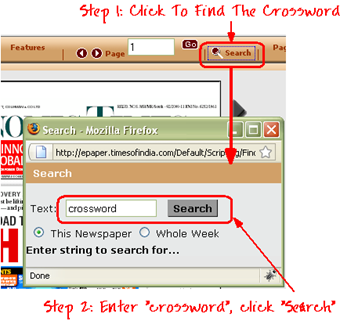
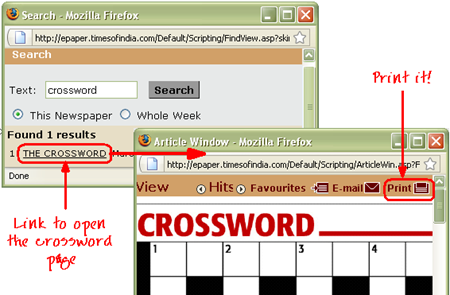
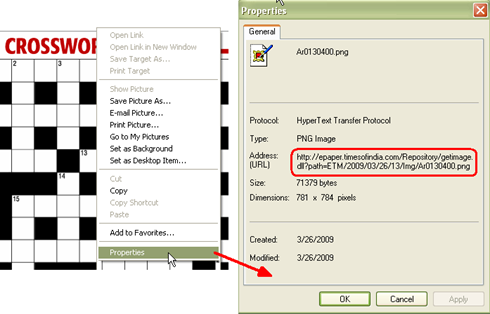
 Go to the epaper site of the Times group:
Go to the epaper site of the Times group: 


 In deletion clues, part(s) of a word are removed to get the solution.
In deletion clues, part(s) of a word are removed to get the solution. 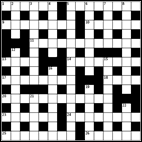 Daily newspaper crosswords like The Hindu have grids with black-and-white squares. A square that contains a letter is white, one that does not is black. Such a grid is a blocked grid.
Daily newspaper crosswords like The Hindu have grids with black-and-white squares. A square that contains a letter is white, one that does not is black. Such a grid is a blocked grid.  A barred grid has white squares only; each square contains a letter. Word divisions are indicated by thick lines.
A barred grid has white squares only; each square contains a letter. Word divisions are indicated by thick lines. 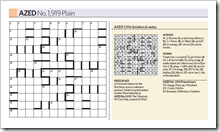
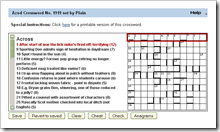
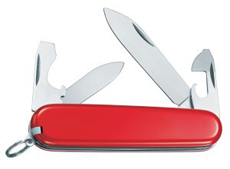 ABOUT is one of those words that you find often in cryptic clues but can't bracket instantly for its meaning. It is remarkable how varied its cryptic function can be.
ABOUT is one of those words that you find often in cryptic clues but can't bracket instantly for its meaning. It is remarkable how varied its cryptic function can be. 
 Peter Biddlecombe, 48, from Buckinghamshire, UK, is one of the quickest cryptic crossword solvers in the world. A regular solver of the Times crossword for about 30 years, his average Times solving time is about 10 minutes and his best-ever time is 3 minutes. At the annual Times Crossword Championship, Peter has been a finalist several times in a row and the winner twice.
Peter Biddlecombe, 48, from Buckinghamshire, UK, is one of the quickest cryptic crossword solvers in the world. A regular solver of the Times crossword for about 30 years, his average Times solving time is about 10 minutes and his best-ever time is 3 minutes. At the annual Times Crossword Championship, Peter has been a finalist several times in a row and the winner twice. 


